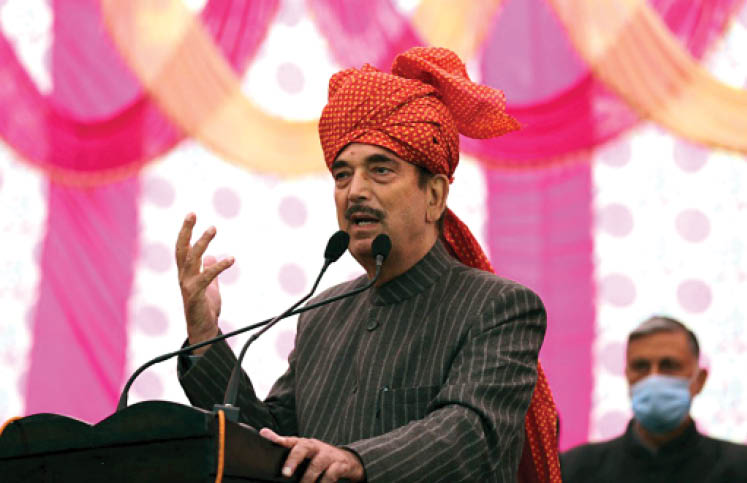Ghulam Nabi Azad acquired the suffix Azad after he became an office-bearer of Indian Youth Congress in 1977, styling himself on Maulana Abdul Kalam Azad.
After Pranab Mukherjee and Tarun Gogoi, the Republic Day honours list this year includes yet another Congress leader, Ghulam Nabi Azad, in a symbolic gesture which showcases the vibrancy of democracy. While rooting for a “Congress-mukt Bharat” the Narendra Modi regime has continued its admiration for those who have spent a lifetime in public life, beginning from humble moorings.
The farewell speech of Prime Minister Narendra Modi to the outgoing Leader of the Opposition in Rajya Sabha, Ghulam Nabi Azad in February last year was a rare tribute. The PM recalled his interaction with Azad when they were the respective Chief Ministers of Gujarat and J&K, and Azad, who had been a virulent critic of the NDA regime, looked overwhelmed.
Azad has been critical of the Centre’s policies regarding Jammu and Kashmir and has been demanding restoration of statehood.
Unlike other J&K leaders, he has not been demanding the restoration of Article 370, whose abrogation he opposed, having accepted the Parliament’s mandate and accepting the fait accompli.
Chief Whip of Congress in Rajya Sabha, Jairam Ramesh criticised Azad for accepting the Padma Bhushan. Opinion in Congress is divided—some like Ramesh are critical, while some like Kapil Sibal, Ashwani Kumar, Anand Sharma, Manish Tewari and Shashi Tharoor have feted Azad. The Sonia Gandhi family has kept quiet.
Ghulam Nabi Azad acquired the suffix Azad after he became an office-bearer of Indian Youth Congress in 1977, styling himself on Maulana Abdul Kalam Azad, the icon of India’s nationalist Muslims, who had opposed Jinnah’s two-nation theory and Pakistan. Beginning his career as a Block Congress Committee office bearer in 1973, he rose to be J&K Youth Congress chief in 1975 and when Congress went out of power in 1977, he was made an office bearer of Indian Youth Congress.
When Azad became a block secretary in 1973, Congress was almost non-existent in J&K. He completed his graduation in Jammu and went for post graduation to Srinagar. (His native Doda, though a Muslim-majority area, geographically is in Jammu division.) As princely J&K had not been part of British administered India, Indian National Congress did not exist there pre-1947. Jammu & Kashmir National Conference, Sheikh Abdullah’s party, was considered as the representative of Congress in that state. Congress unit in J&K was formed only in January 1965. Azad as youth leader organised Gandhi Jayanti in Srinagar for the first time—and thereafter began his successful political journey.
Between 1977-79, the IYC under Sanjay Gandhi was at the vanguard of Congress resurrection: Azad was the whole-time office bearer along with the late Krishna Vasudev Panikker, who ran the organisation which provided sinews to the party.
Those were the days of struggle—for the first time since 1947 Congress was sans trappings of power and hence the life of party whole-timers was not a bed of luxury. In 1979, Sanjay Gandhi asked Azad to contest the Lok Sabha elections from Washim in Maharastra and he won. Azad’s marriage to Shameem Dev, a well-known singer of J&K, was a major event of Congress in the last months of the Sanjay Gandhi era. The wedding in Srinagar was attended by all youth leaders—Sanjay Gandhi piloted an aircraft in which senior Congress leaders travelled for the festivities.
In the Rajiv Gandhi era, Azad was made president of IYC in 1980 and two years later inducted as a junior minister. He served as AICC general secretary, Union Cabinet minister and Chief Minister of J&K thereafter. When Congress sat in Opposition in 2014, he became Leader of Opposition in Rajya Sabha—the House in which Congress had decisive numbers. His term ended in 2021 and his criticism of organisational policies saw him being sidelined in Congress.
While striving for Congress-mukt Bharat, BJP has not been averse to attracting leaders from the GOP. Three NDA Chief Ministers—Himanta Biswa Sarma (Assam), N. Biren Singh (Manipur) and N. Rangaswamy (Puducherry) are former Congressmen. Captain Amrinder Singh is another former Congress CM who is now an ally of BJP. Will Ghulam Nabi Azad be the next prominent Congress leader to emerge as a frontline campaigner of NDA?

